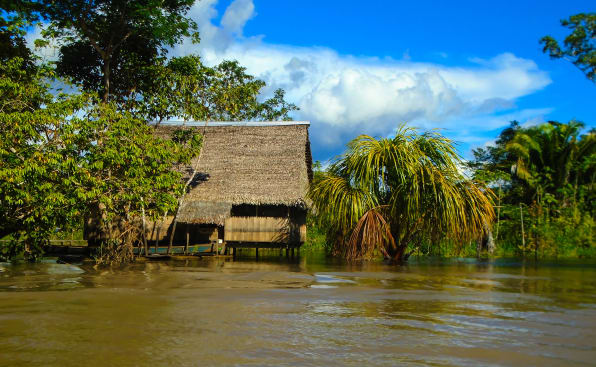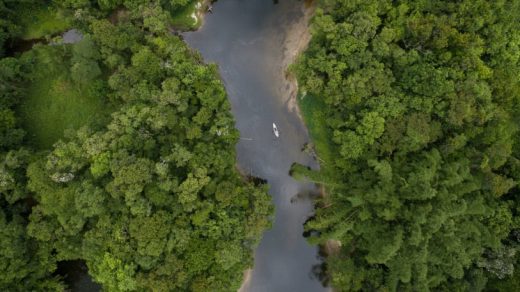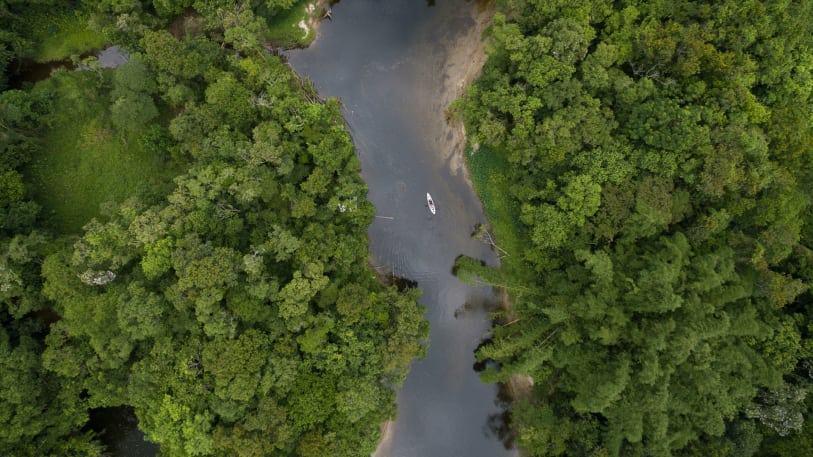I Spent A Month Living With An Amazonian Tribe At 23, And It Changed My Career Forever
In 2000, I was working as an IT consultant in Sydney, Australia, and using some of my earnings to backpack around Southeast Asia. During a hike in the mountains in Northern Laos, I stumbled upon an Akha village and was invited to stay for a week. It was an amazing experience, and by the time I got home I was already determined to go deeper. For the next few months, I researched other opportunities to spent time in remote communities, and eventually I connected with FUNAI, Brazil’s governing body for indigenous peoples.
After many conversations with officials, I managed to secure permission to organize a solo trip to a remote area of the Upper Amazon Basin. Later that year I found myself on a flight to Manaus, the capital of the state of Amazonas, to meet with a local representative of the Tucano tribe. That contact helped me with organizing the logistics and materials for my upcoming trip, advising me to buy gifts for the community leaders such as fishing nets, metal pots, cigarettes and machetes.
With those supplies secured, we set off. And after five days of painful travel, some 50 miles upriver from São Gabriel da Cachoeira, I arrived at the Tucanos’ home and was warmly welcomed. I was 23 years old, and the next few weeks changed my life and career from that point forward.
The Mind And Body Adapt More Than You’d Think
Upon arriving, everything was a struggle. There was no glory or romance here, I soon found, only nature at its most raw.
All day, clouds of insects buzzed incessantly around my head and bit my skin. Since there was nowhere to escape, I had to learn to ignore them. Around noon, the heat was so unbearable that all human activity stops. Even in full shade, I’d sweat what felt like liters of water and would quickly dehydrate if I wasn’t careful. In the afternoon, the rain would often come in such intensity that everything was muted by its roar. Sheltering from it wasn’t always possible, so I’d often sit shivering, waiting for it to stop. I didn’t sleep much, thanks to the bug bites, the rain leaking through the thatched roof, and the hard roots and vines on the ground beneath me.
After a week of this, I was tired beyond belief, suffering from hunger pangs, and oscillating between unbelievably hot and horribly cold. But by the second week, something magical happened: I was so exhausted that I actually slept.
Day by day, the very things that had bothered me so much that I’d wondered how I could possibly endure them began to fade into the background. Before long, I stopped noticing them. It’s remarkable how adaptable the mind and body can be when you cut off alternatives. I’ve constantly used this lesson whenever I’ve faced subsequent challenges, including those of entrepreneurship. From downsizing to fundraising to scaling, the psychological hurdles have sometimes felt overwhelming. But whenever I’ve faced these obstacles, I remember the jungle.

All For One And One For All
When you’re a potential food source for the other inhabitants of your environment, you start to see things differently. I was only a guest for a few weeks, but for my Tucano hosts, the excruciatingly difficult task of finding food was a matter of survival. In order to protect their quality of life, the tribe needs to specialize in tasks and work together.
Meat is a rarity. It can take days for a hunting party to bring back game. The community’s staple food, manioc—a root vegetable known elsewhere as cassava—is difficult to prepare. It takes a long time to extract the product’s toxins with traditional methods in order to make it digestible.
Overcoming all these daily obstacles meant constantly working together. Everyone I met had their own form of specialized knowledge and contributed in some way to the overall health of the community. Despite the fact that illness, accident, and death were ever-present realities, the tribe seemed to function like a highly coordinated organization.
This lesson never left me. The value of bringing people together with specialized knowledge to exchange ideas and support one another is a bedrock of any team’s growth and success. Wherever I’ve lived and whatever I’ve done since in my career, I’ve always done my best to surround myself with as many experienced people as possible.
No Distractions Equals Deeper thinking
It goes without saying that there was no cell-phone signal in the jungle, no power outlets, and no Wi-Fi (all things that many modern-day digital nomads often can’t do without). I was completely cut off from the outside world and and, subsequently, any chance of distracting myself. This was before smartphones came on the scene, but as a 23 year old, I was still a pro at entertaining myself with digital media. It was just so convenient—and remains even more so today. But when distraction isn’t an option, you’re forced to face all your thoughts and emotions head-on.
At first, the only thing I could think about was how much I hated this horrible place. What had I gotten myself into? I had no way of stopping my relentless feelings of frustration and self-recrimination—at least within the first few days. Then, after dinner one night, they came to an end.
With nothing else to divide my attention, I began to reflect on more important things like family, community, love, and purpose. I was actually shocked that this stuff was coming from inside my own head; I’d never had such crystal-clear thoughts about those subjects before. I had never given myself a chance to reflect that deeply.
To be honest, this freaked me out a little at first, but with no choice but to come to grips with these new thoughts, I realized they made me feel stronger, more connected, and better grounded. Meditation is now a key component of my daily routine and helps me grapple with my most pressing problems.
Perspective Is Everything
But perhaps the biggest lesson my experience left me with had to do with perspective. My own life was dramatically different from the lives of my Amazonian hosts. No matter what high-pressure situations or low points I’ve experienced since—from sweating my way through VC pitches to wallowing in despair when my company wasn’t meeting expectations—I know it’s nothing like the realities of surviving in the Amazon.
The month I spent in the jungle taught me, sooner than most people in their twenties learn, to move past self-pity, and to realize the tremendous privilege it is to work in an office with people I respect on something we feel connected to. I am grateful to be part of a team of intelligent, motivated people who care about their jobs.
My visit with the Tucano people has served as a compass for my life and career ever since. Upon returning home, I joined the U.S. Peace Corps and volunteered in Romania for the next two years. I couldn’t have been more prepared. Being stripped of everything I took for granted helps me to remember that things can always get much more difficult. Just as the bee stings and embarrassment subsided, so did my perception of them as negative events. The most challenging experiences of those few weeks—by far the hardest I’d ever experienced up to that point—now serve as guideposts.
Sedarius Perrotta, CEO of Shelf, has managed and built technology teams all over the world, including the Philippines, Romania, Ukraine, Australia, Washington, D.C., and New York.
(48)














